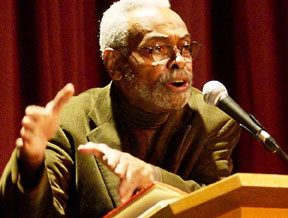
To Be Equal
The life and legacy of Amiri Baraka
Marc Morial NNPA Columnist
“Art is a weapon in the struggle of ideas, the class struggle.” Amiri Baraka
On January 9, with the pas-sing of the prolific poet, playwright, essayist, and critic Amiri Baraka, one of the literary giants of the 20th century was called home. As we offer condolences to his wife, children and family, we remember the 79-year-old Baraka not only for his bold, inventive and iconoclastic literary voice, but as a courageous social justice activist. His ideas and work had a powerful impact on both the Black Arts and Civil Rights movements beginning in the 1960s.
Baraka was best known for his eclectic writings on race and class. He extended many of the themes and ideals of the 1960s Black Power movement into the realm of art, which he saw as a potent weapon of change. And like many good revolutionary artists, he sometimes went out of his way to of-fend the status quo. He has been variously described as a beatnik, a Black nationalist and a Marxist. But he was first and foremost a writer and social commentator of uncommon skill and insight.
His 1963 masterpiece, “Blues People,” which explored the historical roots and sociological significance of the blues and jazz, has become a classic that is still taught in college classrooms today.
Almost every Black and progressive writer and thinker of the 20th century shared a kinship, friendship or feud with Baraka. But, undergirding everything he wrote and stood for was his desire to lift up the downtrodden and disenfranchised, especially in his hometown of Newark, N,J.
As a testament to his broad influence, more than 3,000 people attended his funeral at Newark Symphony Hall. The actor Danny Glover officiated and noted Baraka’s influence on his career. Cornel West called Baraka “a literary genius.” Sonia Sanchez read a poem for him written by Maya Angelou. Speaking at the wake the night before, Jesse Jackson honored Baraka as “a creative activist and change agent who never stopped fighting or working for the formula to create social justice.”
Born Everett LeRoi Jones, the writer changed his name to Amiri Baraka in 1968 to reflect his embrace of Islam and the philosophy of Malcolm X. He attended Rutgers, Howard and Columbia, served in the Air Force and began his literary career in the 1950s in the Beat poet scene of New York’s Greenwich Village. His one-act play, “Dutchman,” won the Obie Award as the best off-Broadway production of 1964. In 1965, he co-founded the Black Arts Movement in Harlem, infusing the Black Power movement with powerful artistic voices. His numerous awards and honors include his selection as the Poet Laureate of New Jersey in 2002 and his 1995 induction into the exclusive American Academy of Arts and Letters.
Controversy was a mainstay of Amiri Baraka’s career. Ishmael Reed, another provocative poet and contemporary of Baraka recently noted, “Amiri Baraka was controversial because his was a perspective that was considered out of fashion during this post race ghost dance, the attitude that says that because we have a black president, racism is no longer an issue, when the acrimonious near psychotic reaction to [Barack Obama’s] election only shows the depth of it.”
Amiri Baraka always challenged us to face such uncomfortable truths – and we are better because of it.
